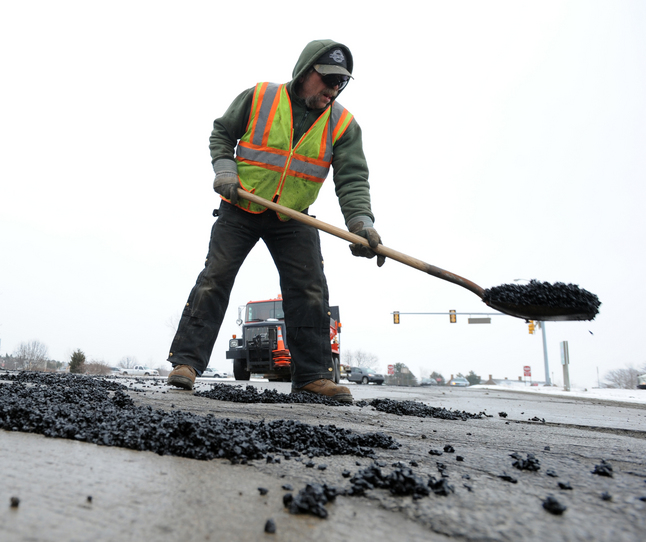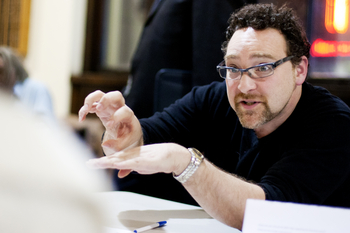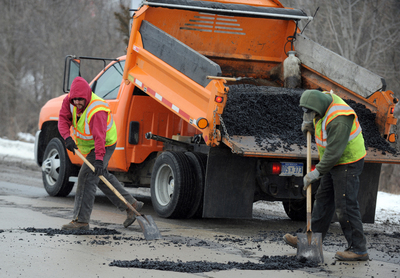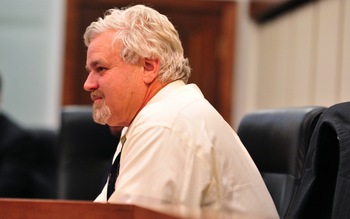Clik here to view.

A Washtenaw County Road Commission employee fills potholes.
Lon Horwedel | AnnArbor.com file photo
Though a countywide road tax is the first option that’s been floated publicly among the Board of Commissioners, any new funding mechanism developed to pay for road repairs will come with an extensive conversation regarding the structure of county governing bodies, including the Road Commission, as well as the county’s goals for improving its transit system as a whole.
“If we want to fix the roads, we ought to talk about the mechanism to pay for them,” said Commissioner Andy LaBarre, D-Ann Arbor. “I don’t think the state and federal formulas and methods are working to the degree that we’d like them to. There needs to be more of a discussion on what we do at the local level.”
Clik here to view.

Conan Smith
Andrew Kuhn | For AnnArbor.com
“We should look at ways that we can create a more resilient transportation system,” said Commissioner Yousef Rabhi, D-Ann Arbor. “I like the idea of finding some kind of funding for roads.”
A major proponent to furthering system-wide solutions on the Board of Commissioners, Conan Smith, D-Ann Arbor, says the county’s transportation system needs to be a dynamic set of options.
“Our transportation system needs to change to meet the needs of a different kind of user,” Smith said. “We’ve focused on transportation too long as roads as primary and public transit as secondary.”
The time may be nigh for commissioners to take action on road and transportation issues because of several coinciding factors, Smith said.
After the retirement of Terri Blackmore, executive director of the Washtenaw Area Transportation Study, the next person to take her place could play a key role, Smith said.
“(WATS) is the planning body that would coordinate all this stuff,” Smith said. “If we got an excellent leader in there that understands the potential that’s a big role they can play.”
Smith also pointed to the recent creation of the Southeast Michigan Regional Transit Authority -- which includes the city of Detroit and Macomb, Oakland, Wayne and Washtenaw counties.
All of the members of the RTA board have been appointed and seated. The body will begin meetings soon.
“There’s opportunity there to think about transportation differently,” Smith said.
The third pressing factor is the time limits on Public Acts 14 and 15 of 2012, which allow Michigan counties to dissolve their road commissions. The laws sunset within the next several years.
The Road Commission
The Road Commission is responsible for the care and maintenance of all roads in Washtenaw County that are not under the jurisdiction of a city. It is funded through state and federal funding streams, and often utilizes grant dollars for projects for which it has to apply in a competitive system.
Clik here to view.

Washtenaw County Road Commission employees fill potholes on Ann Arbor-Saline Road in Pittsfield Township.
Lon Horwedel | AnnArbor.com file photo
“There’s not much of an opportunity to change the road commissioners’ priorities at this point,” Smith said.
Raising any money locally -- through a millage or other means -- would not come without additional oversight from the Washtenaw County Board of Commissioners, said both Conan Smith and Commissioner Dan Smith, R-Northfield Township.
“Bringing (the Road Commission) under the office of the county opens up options for revenue for the road commission that are otherwise closed. I am not likely to vote for a new road tax under the current structure,” Conan Smith said.
The next 20 years will see a dynamic transformation in the transportation field, Conan Smith said, noting that he sees it as vitally important to making sure there’s a public, governing body well-structured to handle those changes and challenges.
“The question becomes, how is (the Road Commission) best structured to take this to the future?” Conan Smith said. “That’s why I’m interested in bringing in that under the county’s umbrella. We need integrated planning and to have the Road Commission participate. It’s not absent, it’s just a less fruitful conversation right now.”
Dan Smith said he has “ no pressing desire to absorb the road commission board, but if that’s the way other commissioners are going to do it to fix the roads, then let’s do it.”
“I don’t get the feeling that we’re going to take the hit of raising revenue without having the oversight and control of how that revenue is being used,” Dan Smith said. “For myself, I feel that it’s probably inevitable that we absorb the road commission. I want to find a way to do that in a way that doesn’t break the way things are working now.”
Road Commissioner Ken Schwartz, a former county board member, said he fears that move would run the risk of politicizing road repair decisions.
Clik here to view.

Ken Schwartz
Ryan J. Stanton | AnnArbor.com file photo
Road commissions across the state of Michigan pool resources for liabilities, insurance and to fund lawsuits, said Roy Townsend, managing director of the Road Commission.
The intense focus on roads also makes the road commission board more efficient, Townsend said, citing the approximate 400 resolutions the board passed in 2012.
“They need to establish that they could deliver services more efficiently,” Schwartz said.
As the customers of the Road Commission, the townships have been happy with the way the Road Commission has handled their money, Townsend said.
“We’re a road agency, not a transit agency,” Schwartz said, noting that it would likely add to countywide confusion regarding transit issues. “We know who our customers are, we have good relationships and we know funding mechanisms.
Should the Board of Commissioners have two public hearings and then decide to consolidate the road commission, it would be the “biggest mistake the county could make,” Schwartz said.
“Given the constraints of the system that they operate in they’re doing all they can,” LaBarre said. “They’re doing it with a system that’s not working.”
Board Chairman Rabhi said he would not be taking a position on the elimination of the road commission.
“If this is a conversation that commissioners want to have, I would facilitate it,” Rabhi said.
Dan Smith said the townships like the arrangement with the Road Commission.
“I certainly don’t want to break something that (the townships) are very satisfied with,” Dan Smith said. “How that happens, I don’t know.”
In 2010, there was talk of expanding the road commission from three to five members, but there was no action taken to do so.
The three county Road Commission board members are paid base salaries of $10,500 per year -- a figure that hasn’t increased in at least 10 years, Schwartz said. They do not receive per diem payments, benefits or retirement savings.
Though the road commissioners are allowed to be reimbursed for their mileage, only Commissioner Fred Veigel requests that his mileage be reimbursed because he lives on the east side of the county, Schwartz said.
Altogether, the Road Commission board costs about $35,000 per year, Schwartz said, noting that amount wouldn’t fund the reconstruction of a gravel road.
Road tax
Washtenaw County officials have considered implementing a tax levy for road work in the past.
In August of 2011, the Road Commission sought a 0.6 mill countywide tax that would have garnered $8.9 million for road repairs.
Had the Board of Commissioners approved the tax, it could have been implemented without voter approval because of state law.
An AnnArbor.com poll conduct at that time found that 61 percent of the 304 respondents supported the new tax, while 36 percent were against it.
But in December 2011, the Board of Commissioners unanimously rejected the road commission’s proposal.
At that point in time, Commissioner Conan Smith was supportive of raising county taxes in the future once the local economy became more stable.
A countywide road tax would still be a tough sell now, Schwartz said, especially since within the city of Ann Arbor, residents pay a 2 mill tax for their own road improvements already.
The county would likely have to cut a check to the city of Ann Arbor for any additional millage raised within its limits, Schwartz said.
Future talks
Rabhi said talks at the state level regarding finding new road funding solutions have not been progressing, and that the county needs to take charge.
“I don’t think we need to wait for Lansing,” Dan Smith said. “It’s time for us to take the bull by the horns here in Washtenaw County. If that means dealing with transit issues, then so be it.”
The funding aspect should take a holistic view to transportation, Rabhi said, mentioning bike lanes, pedestrian access and alternative modes of transportation.
“There’s an interest from a substantial minority in having this conversation,” Conan Smith said. “If the conversation isn’t very carefully framed, and lead in an inclusive way, I think it runs the risk of failing.”
Conan Smith said his preference would be to pursue creating a task force to bring all stakeholders together in the conversation.
“I would be in favor of involving the Road Commission in these discussions,” Dan Smith said. “I’m not looking to lose the expertise and experience from road commissioners. Now is the time for the public to provide input We’re all floating ideas.”
Amy Biolchini covers Washtenaw County, health and environmental issues for AnnArbor.com. Reach her at (734) 623-2552, amybiolchini@annarbor.com or on Twitter.